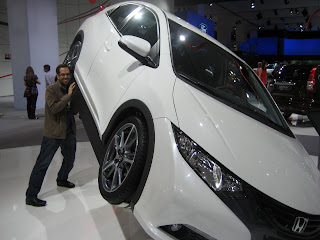Como casi todo el mundo, mi primera intención era visitar los stands de aquellas marcas más alejadas de mis posibilidades: Ferrari, Lamborghini, Porsche,... En esta ocasión, se puede decir que seguí a la masa, con lo que me encontré con que, por una parte, no era posible acercarse ni tocar los coches, además de que la aglomeración hacía insoportable estar en el pabellón. Resultaba curioso como cinco metros más allá no había ningún problema en un stand de una marca con menos glamour.
 Parada obligada fueron también los stands de Honda y Peugeot, por aquello de que son los coches que ahora tengo. En el stand de Honda, aparte de comprobar cómo el Honda CRV no ha cambiado absolutamente nada en dos años, se me cayó el móvil debajo de un coche de exposición (Honda Civic) y tuve que hacer un pequeño alarde para recuperarlo, como se puede ver en la fotografía, je, je, je.
Parada obligada fueron también los stands de Honda y Peugeot, por aquello de que son los coches que ahora tengo. En el stand de Honda, aparte de comprobar cómo el Honda CRV no ha cambiado absolutamente nada en dos años, se me cayó el móvil debajo de un coche de exposición (Honda Civic) y tuve que hacer un pequeño alarde para recuperarlo, como se puede ver en la fotografía, je, je, je. Los stands de marcas alemanas estaban también atestados de gente. La cola a la entrada del pabellón de Audi nos hizo desistir pronto, pero tampoco BMW o Mercedes tenían mucho espacio libre.
Los stands de marcas alemanas estaban también atestados de gente. La cola a la entrada del pabellón de Audi nos hizo desistir pronto, pero tampoco BMW o Mercedes tenían mucho espacio libre.Así que nos dedicamos a otras marcas menos atractivas en teoría, pero que también tenían cosas que ofrecer. En Subaru tenían un chasis transparente que permitía ver el interior del coche con el motor, el chasis, el depósito de gasolina,... Volvo trajo un barco de la Volvo Ocean Race y era posible subirse a él y tener la sensación de navegar por Fráncfort. El stand de
 Infinity tenía una réplica del Red Bull campeón del mundo de Formula 1 del año pasado, lo mismo que Renault. En Renault y en Volkswagen tenían un prototipo de una especie de coche eléctrico de una plaza, más parecido a una moto que a un coche. En el stand de Suzuki, tenían además motos, como se puede ver en la fotografía.
Infinity tenía una réplica del Red Bull campeón del mundo de Formula 1 del año pasado, lo mismo que Renault. En Renault y en Volkswagen tenían un prototipo de una especie de coche eléctrico de una plaza, más parecido a una moto que a un coche. En el stand de Suzuki, tenían además motos, como se puede ver en la fotografía.Y esto es lo que puedo contar de la Feria del Automóvil de Fráncfort. La verdad es que no llevaba ningún tipo de objetivo a la misma, más allá del de disfrutar y ver lo máximo posible. Creo que conseguí con creces mi objetivo ya que esa misma noche, cuando cerraba los ojos, se me aparecían coches flotando... Ya lo he superado, creo.





